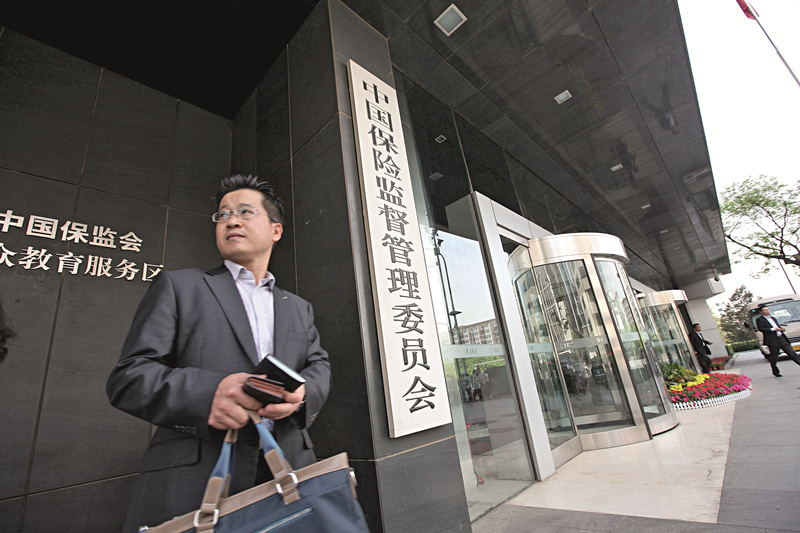China Tightens Screws on Insurance Shareholders

China is clamping down on opaque shareholding structures in the freewheeling $2.7 trillion insurance industry.
The China Insurance Regulatory Commission released new rules on Wednesday that cut the ceiling of single shareholders to 33% from the current 51%. Investors will have to use their own funds to buy a stake in an insurer and will be prohibited from hiding ownership through proxies.
Insurance companies should have “clear and reasonable shareholding structures,” and must reveal “the actual controlling entity to the regulator,” the CIRC said in a statement.
About 12 private insurers have big shareholders with holdings exceeding the new 33% cap, according to Caixin’s calculations. These include Foresea Life Insurance Co., Guohua Life Insurance Co. and Evergrande Life Insurance Co. The CIRC said existing shareholders won’t immediately be affected by the new rules unless the regulator detects potential risks.
Generally, the regulator will allow big shareholders with stakes exceeding 33% to keep their holdings, though they will need to be gradually reduced in future company fundraising. However if the regulator sees a company as having dodgy corporate governance, it will require shareholders to comply with the new limit.
“Regulatory measures will be issued based on each company’s specific condition,” a CIRC official said.
The new rules, which take effect on April 10, are the latest steps by the CIRC to tame the insurance industry, which turned into a piggy bank for some large shareholders to fund big-ticket acquisitions and risky investments that came to be seen as serious threats to China’s financial system.
The clampdown reverses liberalization led by then-CIRC chairman Xiang Junbo of the cash-rich but sleepy industry.
In 2013, the CIRC increased the maximum stake of insurance shareholders to 51% from 20%, sparking a stampede by private investors to get into insurance. In practice, a single investor was often able to get the absolute controlling stake with shares held by relatives or affiliated parties.
Insurers spent lavishly on overseas acquisitions such as soccer clubs and world-class properties, while selling high-risk products to cover highly leveraged deals. Last year, Beijing ousted Xiang, accusing him lax oversight and corruption that included trading power for sex, profiting from his position and accepting real estate as bribes.
Anbang Insurance Group, China's third-largest insurance provider in terms of premiums, is a prime example of opacity that exploded. According to a Caixin report, behind the insurer’s seemingly dispersed shareholding structure are a series of complicated transactions among more than 100 companies, all linked to the company’s former chairman, Wu Xiaohui.
In late February, the CIRC said it was taking over Anbang for a year to protect consumers, as the company struggled to pay back investors following a massive global buying spree. Wu has been charged with committing economic crimes.
Under the new rules, regulators will trace shareholders’ investments into an insurance company back to its original funding source to prevent proxy shareholding while banning ownership transfer through stake pledges and other financing methods.
The CIRC will also prohibit buying insurance companies’ stakes with insurance funds or money borrowed by pledging insurance companies’ assets.
A CIRC official said although previous rules have required investors to use their own capital to invest in insurers, their capital flows were often not closely monitored. The new rules will scrutinize investors’ capital sources.
The CIRC is also planning to introduce new rules regarding insurers’ board of directors to strengthen their corporate governance. In December, the commission published draft rules requiring insurance companies to have at least two independent directors on their boards. Companies with one controlling shareholder should have half of their board members consisting of independent directors, according to the draft rules, which are set to take effect this year.
The CIRC official said the commission will step up enforcement of the shareholding rules and work with the public security department to punish violators to “put more teeth” into insurance regulation.
Contact reporter Han Wei (weihan@caixin.com)

- 1Cover Story: China Carves Out a Narrow Path for Offshore Asset Tokenization
- 2Drownings Shake Chinese Enthusiasm for Travel to Russia
- 3Over Half of China’s Provinces Cut Revenue Targets
- 4Li Ka-Shing’s Port Empire Hit by Forced Takeover Amid Panama Legal Dispute
- 5In Depth: China’s Mutual Fund Industry Faces Overhaul After a Banner 2025
- 1Power To The People: Pintec Serves A Booming Consumer Class
- 2Largest hotel group in Europe accepts UnionPay
- 3UnionPay mobile QuickPass debuts in Hong Kong
- 4UnionPay International launches premium catering privilege U Dining Collection
- 5UnionPay International’s U Plan has covered over 1600 stores overseas






